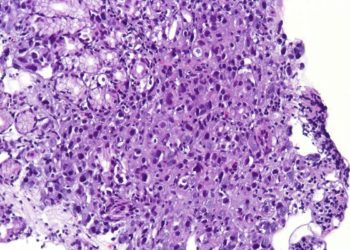Helicobacter pylori, Homologous Recombination Genes, and Risk of Gastric Cancer
1. The following genes had statistically significant increased odds ratio of gastric cancer; BRCA2, ATM, BRCA1, MLH1, PALB2, APC, MSH6, MSH2, CDH1.
2. Patients with H. pylori infection and a pathogenic variant had a higher cumulative risk of gastric cancer than noncarriers infected with H. pylori (45.5% vs. 14.4%) at 85 years of age.
Evidence Rating Level: 3 (Average)
Study Rundown: Helicobacter pylori infection along with germline pathogenic variants (CDH1, BRCA1/2, etc.) contribute to the risk of gastric cancer. Eradication of H. pylori has been shown to reduce the incidence of gastric cancer, but it is unclear whether this effect is primarily seen in genetically susceptible individuals. This study evaluated the combined effect of pathogenic variants in cancer-predisposing genes and H. pylori infection status on the risk of gastric cancer. It was shown that the following genes statistically significantly increased the odds ratio of gastric cancer; BRCA2, ATM, BRCA1, MLH1, PALB2, APC, MSH6, MSH2, and CDH1. Patients with pathogenic variants in those genes had a median age of gastric cancer diagnosis of more than 10 years younger than that among noncarriers. A subset of patients was included in a survival analysis where it was found that overall survival did not differ significantly between carriers and noncarriers. Analysis among patients with H. pylori infection, it was found that the relative excess risk of gastric cancer for pathogenic variants and H. pylori infection was 16.01 (2.22 to 29.81). Four out of the nine gastric cancer risk genes (ATM, BRCA1, BRCA2, and PALB2) encode proteins that mediate homologous recombination, and it was found that those with H. pylori infection and among carriers of those pathogenic variants, the cumulative risk of gastric cancer in persons 85 years of age was 45.5% vs 14.4% in noncarriers with infection. This is compared to a 5% cumulative risk without infection regardless of carrier status. Limitations of this study included its retrospective nature and its analysis of only single-nucleotide variants and small insertion-deletions. The strengths of this study included its large sample size. Overall, this study showed that in patients with known pathogenic variants and H. pylori infection, their risk of gastric cancer increases, which highlights the importance of H. pylori testing in that population.
Click to read the study in NEJM
Relevant Reading: Family History of Gastric Cancer and Helicobacter pylori Treatment
In-Depth [case-control study]: This study included two independent study cohorts, BioBank Japan (BBJ) and Hospital based Epidemiologic Research Program at Aichi Cancer Center (HERPACC), with a total of 11,789 patients with gastric cancer and 43,582 controls, with the HERPACC cohort having confirmed prior H. pylori infection. An analysis of 27 cancer-predisposing genes was compared among participants. There were slight differences in age and sex distributions, as well as rates of intestinal cancer between the two cohorts. In the BBJ cohort, the following genes showed statistically significant (based on a Bonferroni-corrected threshold of significance) increased odds ratio of gastric cancer; BRCA2 (OR 5.08), ATM (5.50), BRCA1 (4.81), MLH1 (14.45), PALB2 (3.71), APC (14.17), MSH6 (5.08), MSH2 (4.85), CDH1 (8.04). Further analysis within those nine gastric cancer risk genes showed that the median age at diagnosis in patients with those pathogenic variants was more than 10 years younger than that among noncarriers (up to 20.5 years for CDH1). It was also found that a family history of related cancer types was more common among carriers of pathogenic variants than among non-carriers. A subset of patients in the BBJ cohort was included in the survival analysis with a median follow-up time of 7.5 years, and it was found that overall survival did not differ significantly between carriers and noncarriers (HR 1.27; 95%CI, 0.82 to 1.97; P=0.28). In the HERPACC cohort, it was found that the relative excess risk of gastric cancer followed an additive interaction for pathogenic variants and H. pylori infection (16.01; 95%CI, 2.22 to 29.81; P=0.02). Four out of the nine gastric cancer risk genes (ATM, BRCA1, BRCA2, and PALB2) encode proteins that mediate homologous recombination, and it was found that those with H. pylori infection and among carriers of those pathogenic variants, the cumulative risk of gastric cancer in persons 85 years of age was 45.5% (95%CI, 20.7 to 62.6) vs 14.4% (95% CI, 12.2 to 16.6) in noncarriers with infection. This is compared to a 5% cumulative risk without infection regardless of carrier status. Overall, this study showed that in patients with known pathogenic variants and H. pylori infection, their risk of gastric cancer increases, which highlights the importance of H. pylori testing in that population.
Image: PD
©2023 2 Minute Medicine, Inc. All rights reserved. No works may be reproduced without expressed written consent from 2 Minute Medicine, Inc. Inquire about licensing here. No article should be construed as medical advice and is not intended as such by the authors or by 2 Minute Medicine, Inc.








